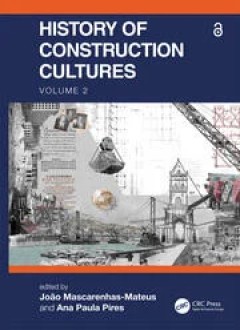Filter by

Research Journeys to Net Zero : current and future leaders
- Edition
- -
- ISBN/ISSN
- 9781003380566
- Collation
- -
- Series Title
- -
- Call Number
- -
- Edition
- -
- ISBN/ISSN
- 9781003380566
- Collation
- -
- Series Title
- -
- Call Number
- -

History of Construction Cultures Volume 2 : Proceedings of the 7th Internatio…
Volume 2 of History of Construction Cultures contains papers presented at the 7ICCH – Seventh International Congress on Construction History, held at the Lisbon School of Architecture, Portugal, from 12 to 16 July, 2021. The conference has been organized by the Lisbon School of Architecture (FAUL), NOVA School of Social Sciences and Humanities, the Portuguese Society for Construction History …
- Edition
- -
- ISBN/ISSN
- 9781003173434
- Collation
- -
- Series Title
- -
- Call Number
- -

Human development and the Catholic social tradition : towards an integral eco…
Buku ini membawa teori dan praktik pembangunan ke dalam dialog dengan tradisi keagamaan untuk membangun visi pembangunan transdisipliner baru dengan ekologi integral sebagai intinya. Buku ini berfokus pada tradisi sosial Katolik dan konsepsinya tentang pembangunan manusia integral, di satu sisi, dan pada karya ekonom dan filsuf Amartya Sen yang mendukung pendekatan pembangunan manusia, di sisi …
- Edition
- -
- ISBN/ISSN
- 9781003121534
- Collation
- 1 online resource (118 Pages)
- Series Title
- -
- Call Number
- 233 DEN h

The ethics of national security intelligence institutions : theory and applic…
Buku ini membahas etika lembaga intelijen keamanan nasional yang beroperasi dalam demokrasi liberal kontemporer. Pengumpulan intelijen oleh badan-badan seperti CIA, MI6, dan Mossad melibatkan praktik-praktik yang tampaknya tidak konsisten dengan prinsip-prinsip moralitas biasa – praktik-praktik seperti berbohong, memata-matai, memanipulasi, dan tindakan rahasia. Namun, dalam upaya mempertahan…
- Edition
- -
- ISBN/ISSN
- 9781003106449
- Collation
- 1 online resource. (288 Pages)
- Series Title
- -
- Call Number
- 172.4 HEN e

Phytotechnology with biomass production; sustainable management of contaminat…
Buku ini menjelaskan konsep penggunaan fitoteknologi dengan produksi biomassa untuk meningkatkan kualitas tanah dan memulihkan lokasi yang terkontaminasi ke kondisi yang bermanfaat dan bernilai ekonomi dan sosial. Fitoteknologi dengan Produksi Biomassa: Pengelolaan Berkelanjutan Lokasi yang Terkontaminasi berfokus pada penerapan tanaman biofuel generasi kedua, terutama Miscanthus, pada tanah pa…
- Edition
- -
- ISBN/ISSN
- 9781003082613
- Collation
- 1 online resource (242 Hal)
- Series Title
- -
- Call Number
- 660.63 ERI p

Budgetary policy modelling: public expenditures
The focus of this volume is on the European context of public budget policy and a variety of different approaches are used - theoretical modelling, econometrics and applied general equilibrium modelling. Empirical evidence and case studies of European countries are contained in all the papers. The papers cover the four general themes of public budget policy: * economic stabilization, in view …
- Edition
- -
- ISBN/ISSN
- 9780203979372
- Collation
- -
- Series Title
- -
- Call Number
- -

Belgian exceptionalism : Belgian politics between realism and surrealism
- Edition
- -
- ISBN/ISSN
- 9781003104643
- Collation
- -
- Series Title
- -
- Call Number
- -
- Edition
- -
- ISBN/ISSN
- 9781003104643
- Collation
- -
- Series Title
- -
- Call Number
- -

Integrating Science and Politics for Public Health
This open access book bridges the divide between political science and public health, whilst simultaneously embracing the complexities and differences of both. Although public health is inherently political, the tools and insights of political science are often ignored in public health scholarship. Bringing together academics and researchers working at the intersection of both, the book demonst…
- Edition
- 1
- ISBN/ISSN
- 978-3-030-98985-9
- Collation
- -
- Series Title
- Palgrave Studies in Public Health Policy Research
- Call Number
- XVIII, 345

Nachhaltiges Personalmanagement als Schlüsselfaktor für erfolgreiches Wirts…
Mit diesem Open-Access-Buch liefert Elisabeth Geursen erstmals Erkenntnisse zum Nachhaltigkeitsbegriff im Personalmanagement, auf den mit „Human Capital“ oder „Human Ressource“ referiert wird, mithilfe primär linguistischer Methoden. Der Nachhaltigkeitsidee wird im deutschsprachigen und internationalen Kontext gesellschaftspolitische Relevanz zugewiesen. Geursen präsentiert im Bereich…
- Edition
- 1
- ISBN/ISSN
- 978-3-662-64738-7
- Collation
- -
- Series Title
- Sprache und Wirtschaft
- Call Number
- XXXII, 521

Demographic and Family Transition in Southeast Asia
This open access book presents the trends and patterns of demographic and family changes from all eleven countries in the region for the past 50 years. The rich data are coupled with historical, cultural and policy background to facilitate an understanding of the changes that families in Southeast Asia have been going through. The book is structured into two parts. Part A includes three se…
- Edition
- 1
- ISBN/ISSN
- 978-3-030-85679-3
- Collation
- -
- Series Title
- -
- Call Number
- XIII, 112
 Computer Science, Information & General Works
Computer Science, Information & General Works  Philosophy & Psychology
Philosophy & Psychology  Religion
Religion  Social Sciences
Social Sciences  Language
Language  Pure Science
Pure Science  Applied Sciences
Applied Sciences  Art & Recreation
Art & Recreation  Literature
Literature  History & Geography
History & Geography